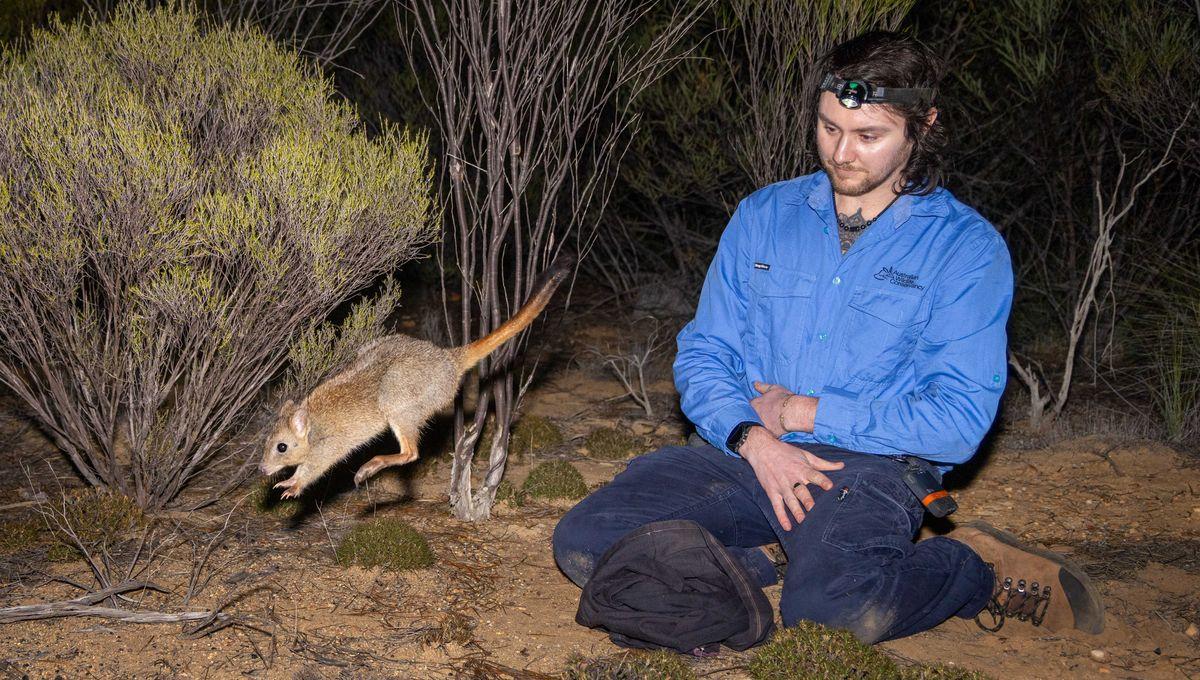Woylies Boing Back Into Western Australia Thanks To Groundbreaking Wildlife Project

Woylies Boing Back Into Western Australia Thanks To Groundbreaking Wildlife Project
Over 100 endangered woylies have been set free from a fenced-off area of Mt Gibson Wildlife Sanctuary, marking an energetic leap in their return to life in Western Australia’s Wheatbelt region.
Never mind kangaroos or koalas, woylies have to be up there with the most audaciously Aussie of all animals. Picture a mouse crossed with a squirrel, but with spring-loaded legs that let it hop around under the cover of night, foraging for fungi in the bush. Like many of Australia’s wonderfully weird mammals, they're marsupials, meaning they’re born in a relatively undeveloped, bean-like state and are fostered in their mother’s pouch. The lovable species were wiped out from the Wheatbelt over 100 years ago after the introduction of new predators, such as foxes and cats, but an ongoing conservation project is hoping to restore their presence. In 2015, the Australian Wildlife Conservancy (AWC) set up a 7,830-hectare (19,348-acre) fenced area at Mt Gibson Wildlife Sanctuary in Badimia Country and filled it with 162 woylies from three source sites. The fenced area was cleared of all foxes and cats, giving the woylies a safe space to live, reproduce, and grow their population. Ten years on, the population has boomed to over 1,000, so experts at the AWC decided it was time to make the next step. In a recent move, a small cohort of individuals was selected to move from inside to outside the safe haven. A glimpse of the fenced-off area at Mt Gibson Wildlife Sanctuary. Image credit: © Wayne Lawler “Woylies are one of the great success stories for the sanctuary because once the threat of cats and foxes was removed, they were able to thrive as a population and have even shown good resilience through a recent severe drought in the region,” Dr Amanda Bourne, AWC Regional Ecologist, said in a statement. Just before the release, there were already positive signs that the woylies were ready for the real world. Cameras outside of the pen spotted that some woylies (often the same individuals, again and again) had escaped the fenced-off area and were appearing to happily thrive. “The cameras have picked up multiple females with young in their pouches or at heel, and we caught one Woylie two years in a row. These are all indications that some Woylies are breeding and surviving outside the fence, and that the species is ready for an intentional release,” explained Dr Bourne. Harriet Harte and a woylie springing from the bag. Image credit: © Brad Leue In the coming months, ecologists will be keeping a close watch as the woylies find their feet as they venture "beyond the fence". A handful have been fitted with tiny radio collars, allowing scientists to track their movements and see how life on the outside stacks up against the safety of the fenced area. The team will also run a trapping survey next month to check in on their health and survival. Woylies are not the only animals gaining from this kind of conservation effort. In 2022 and 2023, respectively, the AWC tested similar “beyond the fence" strategies with the Brushtail Possum and the Western Quoll (Chuditch). These two species are larger and a bit tougher when it comes to predators like cats, but the trials still proved promising. “Releases of both Brushtail Possums and Chuditch have been successful to date, with high rates of survival and successful breeding. The success of these releases, together with the ongoing presence of some Woylies outside the exclosure provided the confidence we needed to attempt the release of Woylies outside the exclosure at Mt Gibson, which we hope will be as successful as possums and Chuditch have been,” Dr Bourne added.



